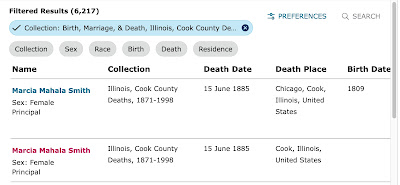 |
| Chicago from the train |
Long day. I caught a 6:35 a.m. Metra train into Chicago’s Union Station, took Amtrak’s 8:15 a.m. Saluki to Champaign, and rode the rest of the way to Springfield by bus. I arrived at the Illinois Family History Expo in time for the 2:00 p.m. opening keynote and spent the rest of the afternoon and evening attending conference sessions. The last class finished about 8:40 p.m. which left me some time to take my fiddle up to the 14th floor garden patio to practice and now I’m back in my room, ready to share a few of the many things that I learned that might be of use to Chicago researchers.
The opening keynote was a talk by Bernard E. Gracy, Jr. titled “Ancestral Echos” and a quick summary might go something like this: the times and places and events associated with the lives of our ancestors echo down through the generations. Our family history becomes richer and more understandable when we learn to identify those echoes.
As I’ve mentioned before, my husband’s ggg-grandfather, James Ayer Smith, traveled from upstate New York to Chicago in 1835 to establish himself as a manufacturing hatter, an occupation that would sustain his extended family for the next 40 years. There were setbacks and there were successes and family stories lead me to believe that his descendants were proud of his courage and his accomplishments.
I have to wonder if his example didn’t echo strongly in his granddaughter’s decision to run her husband’s business after his untimely death? And I wonder what role it played in her grandson’s decision to start his own business? I know that both my husband and I looked to him for inspiration as we made a decision to launch our own entrepreneurial endeavor.
So you have Chicago ancestors? What echoes from their lives have come down through the generations? Where did they come from? When did they arrive? Where did they live? Who were there neighbors? Did they move around the city or stay in one place? What were their communities like? Did they associate with any religious congregations? What about the schools they went to? Did they belong to any clubs? What did they do for recreation? The more you are able to place their lives in context, the better chance you'll have of identifying the echoes. Reading through early issues of the Chicago Tribune online is a very enjoyable way to see the city through the eyes of its former inhabitants.
The first two classes I attended were given by Arlene H. Eakle, Ph.D. One was titled “What is “The South,” and Why is it Such a Genealogy Research Challenge” and the other was titled “Want Land Will Travel: Land and Property Records in the Southern US--State-by-State.” I have no experience researching in southern states and I thought it would be both useful and enjoyable to learn something new. It was.
Most of the information was state and region specific but I came away with one tip that is universal. Put in terms of Chicago research, if you’re reading a book related to family history in Cook County, check out the sources listed and follow up. You might discover a new-to-you resource that would be of help in your research.
Another tip. Record loss is a stumbling block for southern research and a similar challenge exists for Chicago research because of the 1871 fire. Just because one record was destroyed doesn’t mean there isn’t an alternate source for the information. Look around and think creatively. You might be surprised at what you find.
The next class I went to was James L. Tanner’s “Ancestry.com for Experienced Users.” The take-away from that? Use the website’s card catalog to select specific databases to search. Try it. Type in “chicago” and look at the list that comes up. Narrow it by using the filters. “Chicago Irish Families, 1875-1925” is a valuable database for Chicago research but you might not find it doing a global search. Also check out Reminiscences of early Chicago and vicinity. It’s fun to read and it’s a useful way to gain insights into the lives of early Chicagoans.
 |
| Evening view from the 14th floor garden patio |
The last class I attended was Jennifer Holik’s “Visualizing Your Genealogical Data.” Jennifer is a Chicago researcher and her talk on using Excel, OneNote, maps, and blogs to identify information gaps and craft focused research questions was sprinked with examples from her own Cook County research.
Here’s a tip I think you’ll like: if the streets your ancestors lived on no longer exist (maybe they’ve been replaced by a university or a shopping center) use historical maps to help in your search. Jennifer mentioned one in particular--Tillotson’s--and I’ve pulled up a 1910 version online for you. Check it out!
And so, a long day comes to an end. Four classes tomorrow and two of them will focus on research in cities. Certainly there will be something valuable for Chicago researchers there.




2 comments:
Thanks for the taste since I couldn't make it this time!
Harold
Thank you for this great takeaway on the classes you attended. I follow Jennifer Holik, and I'm sure her class was meticulous and useful. It's true about lack of records in the South, not so much The War as traditions of not recording vital statistics, as in no births or marriages recorded before 1915/1910 in SC. Anyway, thanks for this useful account.
Post a Comment